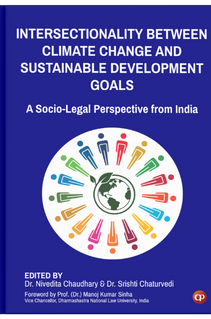The Solution to Climate Change Lies in Education

by Mona Sehgal1 & Shreya Suman2
1Doctoral Research Scholar, Law College Dehradun, Uttaranchal University, India; 2Doctoral Research Scholar, Uttaranchal Institute of Technology, Uttaranchal University, India.
10.46679/9788196780524ch03
This chapter is a part of: Intersectionality Between Climate Change and Sustainable Development Goals: A Socio-Legal Perspective from India
ISBN (Ebook):978-81-967805-2-4
ISBN (Hardcover Print):978-81-967805-0-0
ISBN (Softcover Print):978-81-967805-3-1
© CSMFL Publications & its authors.
Published: August 28, 2025
https://dx.doi.org/10.46679/9788196780524ch03
Abstract
No city is free from the adverse consequences of climate change. The Intergovernmental Panel on Climate Change (IPCC) First Working Group Report 2021 makes it abundantly clear that humankind is to blame for the current situation of climate crisis. According to the United Nation it has already been declared that the sixth and final mass extinction is already taking place. Numerous environment-related effects, including heat waves, droughts, floods, and scarcity of water, exposes the helpless population, particularly children, to diseases and malnutrition. Climate change education is crucial for empowering young people and preparing them for future crises. Green education and awareness can help convert apprehension into empowerment, ensuring they have access to accurate information and conversations about climate change, affecting generations. As a result, it is critical that children be educated on climate change from an early age, when they are at their most impressionable and at the nurturing phase. The author discusses the importance of environmental awareness and the impact of climate change on the planet. It emphasizes the need for incorporating these topics into education to prepare students for future disasters and future mitigation strategies. The article also discusses the perception of climate change education among teachers and students.
Keywords: climate change, environment education, environmental awareness, pollution, sustainable development program.
References
- Press Information Bureau. (2023, March 15). Government promotes environment protection and nature education through curricula on conservation of forest, water and soil. https://pib.gov.in/PressReleaseIframePage.aspx?PRID=1907255.
- Anderson, A. (2010). Combating climate change through quality education (Policy Brief No. 2010-03). Brookings Institution. https://eric.ed.gov/?id=ED512832.
- Balaji, M. (2022, July 15). Why should climate change be included as a part of the school curriculum in India? Climate Connection. https://climateconnection.org.in/updates/why-should-climate-change-be-included- part-school-curriculum-india.
- Rousell, D., & Cutter-Mackenzie-Knowles, A. (2019). A systematic review of climate change education: Giving children and young people a ‘voice’ and a ‘hand’ in redressing climate change. Children’s Geographies, 18(2), 191–208.
- UNESCO. (n.d.). Climate change education. https://www.unesco.org/en/climate- change/education.
- Pruneau, D., Khattabi, A., & Demers, M. (2010). Challenges and possibilities in climate change education. Journal of Environmental Studies, 7(9), 15–24.
- Mochizuki, Y., & Bryan, A. (2015). Climate change education in the context of education for sustainable development: Rationale and principles. Journal of Education for Sustainable Development, 9(1), 4–26.
- Press Information Bureau. (2024, May 8). Council of Scientific and Industrial Research (CSIR) – Jigyasa hosts Student-Science Connect program on climate change. https://pib.gov.in/PressReleasePage.aspx?PRID=2020007.
- Cordero, E. C., Todd, A. M., & Abellera, D. (2008). Climate change education and the ecological footprint. Bulletin of the American Meteorological Society, 89(6), 865–872.
- Lehtonen, A., Salonen, A. O., & Cantell, H. (2018). Climate change education: A new approach for a world of wicked problems. In W. Leal Filho (Ed.), Handbook of climate change communication: Vol. 1. Climate change awareness and communication (pp. 339–374). Springer.
- Ready for the world: Empowering learners through climate change education. (2024, February 2). https://www.cambridgeinternational.org/Images/707181-climate- change-education-introduction-paper.pdf.
- Monroe, M. C., Plate, R. R., Oxarart, A., Bowers, A., & Chaves, W. A. (2017). Identifying effective climate change education strategies: A systematic review of the research. Environmental Education Research, 25(6), 791–812.
- Press Information Bureau. (2022, March 16). Incorporation of climate change in the school curriculum. https://pib.gov.in/PressReleaseIframePage.aspx?PRID=1806707
- World Economic Forum. (2023, July 3). How can we improve climate change education in schools? Start with the teachers. https://www.weforum.org/stories/2023/07/climate- change-education-schools-teachers/
- McCright, A. M., O’Shea, B. W., Sweeder, R. D., Urquhart, G. R., & Zeleke, A. (2013). Promoting interdisciplinarity through climate change education. Nature Climate Change, 3(8), 713–716.
- Ghosh, R., & Dutta, S. (2019, May 27). UGC mandates Environmental Studies at UG level. The Times of India. https://timesofindia.indiatimes.com/education/news/ugc- mandates-environmental-studies-at-ug-level/articleshow/69524882.cms
- Mizoram Science, Technology & Innovation Council. (2024, October 28). Capacity building on climate change issues for teachers & faculties of educational institutions at Champhai. https://mistic.mizoram.gov.in/capacity-building-on-climate-change- issues-for-teachers-faculties-of-educational-institutions-at-champhai.
- The Hindu Bureau. (2024, April 28). Survey of T.N. students on climate literacy highlights need for enhancing curriculum in schools and colleges. The Hindu. https://www.thehindu.com/news/cities/chennai/survey-of-tn-students-on- climate-literacy-highlights-need-for-enhancing-curriculum-in-schools-and- colleges/article68117993.ece.
- Uniindia News Service. (n.d.). Meghalaya mulling incorporating climate change in school curriculum. https://www.uniindia.com/news/east/education-meghalaya-climate- change/2751958.html.
This book is available worldwide via EBSCOhost Academic Collection, EBSCO E- books, Google Play Books, Amazon, World Cat Discovery Service/OCLC, CSMFL Bookstore, and 200+ book resellers and academic content vendors.
Statement on Publication Ethics
We, at CSMFL Publications, are committed to ensure the unbiased and transparent publishing, and upholding the high standards of editorial integrity in our publications. To know more, please read our Statement on Publication Ethics, Editorial Integrity & Misconduct